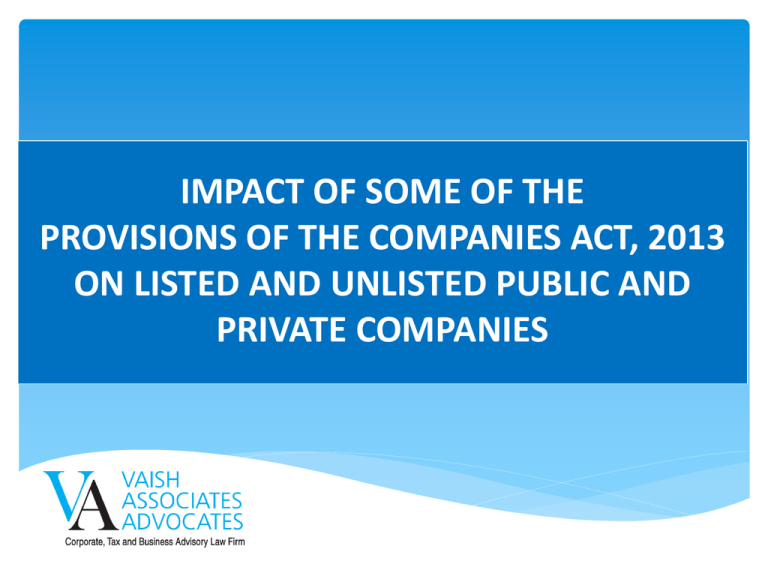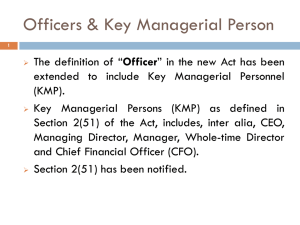impact of the companies act, 2013 on listed and unlisted public
advertisement

IMPACT OF SOME OF THE PROVISIONS OF THE COMPANIES ACT, 2013 ON LISTED AND UNLISTED PUBLIC AND PRIVATE COMPANIES IMPACT OF THE COMPANIES ACT, 2013 ON LISTED AND UNLISTED PUBLIC/PRIVATE COMPANIES SR. NO. Sec Provision of Companies Act, 2013 Impact Implementation Time Uniform Financial Year 1. 2(41) Companies can follow any other 31st March, 2016. period as financial year of the Company upto March 31 2016 and thereafter, if it wants to do A company which is a subsidiary of a foreign so, it will have to apply to NCLT entity and is required to follow a different for exemption financial year for consolidation of its accounts outside India may have a different financial year with prior approval of the National Company Law Tribunal (‘NCLT’). Companies are now required to have a uniform financial year ending on March 31 every year. Change in Official Publication 2. 12 A company shall disclose certain information in its business letters, billheads, letter papers and in all its notices and other official publications. A company is required to disclose the following (a) Full name of the Company (c) Address of its registered office (d) Corporate Identity Number allotted by ROC) (e) Telephone number, fax number, e-mail and website addresses, if any. 1st April, 2014 Remarks IMPACT OF THE COMPANIES ACT, 2013 ON LISTED AND UNLISTED PUBLIC/PRIVATE COMPANIES SR. NO. Sec Provision of Companies Act, 2013 Impact Implementation Time Change in promoter shareholding 3. 93 Every listed company shall file return with the Registrar of Companies for any change in the holding of Promoters or top 10 shareholders within 15 days of such change. Mechanism to monitor shareholding of promoters and top 10 shareholders should be in place. 1st April 2014 Annual General Meetings 4. 101 An annual general meeting and an extra ordinary general meeting can be held by giving not less than clear twenty-one (21) days’ notice. However such meetings may be held at a shorter notice with approval of ninety five percent (95%) of the members entitled to vote at such meeting of the company. Earlier, holding of Annual General Meetings at a shorter notice required the approval of 100% of the members entitled to vote at such meeting of the company. Explanatory Statement is now made mandatory for all the special business items for all companies. Previously private companies had the option to dispense with the need for having explanatory statement for special business. Earlier, Extra-ordinary general meetings could have been held outside India. Extra-ordinary general meetings shall now be held in India. 1st April, 2014 Remarks IMPACT OF THE COMPANIES ACT, 2013 ON LISTED AND UNLISTED PUBLIC/PRIVATE COMPANIES SR. NO. Sec Provision of Companies Act, 2013 Impact Implementation Time Remarks Quorum for General Meetings 5. 103 Unless the articles provide for a larger number, in case of a public company: (i) 5 members personally present if the number of members as on the date of meeting is not more than 1000; (ii) 15 members personally present if the number of members as on the date of meeting more than one thousand but up to 5000; (iii) 30 members personally present if the number of members as on the date of meeting exceeds 5000. In case the adjourned general Need meeting or change of day, time implementation. or place, a notice of not less than 3 days shall be given to the members either individually or by publishing an advertisement in newspapers (one in English and one in vernacular language). based In the adjourned meeting, the members personally present shall constitute quorum. Consolidation of Accounts 6. 129 The 2013 Act now mandates consolidated financial statements for any company having a subsidiary and its adoption at the annual general meeting of the company. The financial statements to be placed before annual general meeting shall include a separate statement containing the salient features of the financial statement of a company’s subsidiaries. ‘Subsidiary’ for the purpose of this requirement shall include associate company and joint venture. If consolidation of associate is not possible, reasons for the same will have to be stated. A company is required to comply with this provision based on the audited financials commencing effective from 1st April, 2014. IMPACT OF THE COMPANIES ACT, 2013 ON LISTED AND UNLISTED PUBLIC/PRIVATE COMPANIES SR. NO. Sec Provision of Companies Act, 2013 Impact Implementation Time Corporate Social Responsibility (CSR) 7. 135 Every company having net worth of INR 5 billion or more, or turnover of INR 10 billion or more or a net profit of INR 50 million or more during any financial year shall constitute a CSR Committee. A company is required to comply with this provision based on the threshold limits in the audited financials commencing from 1st April, 2014 A CSR Committee consisting of three (3) or more directors, out of which at least one (1) director should be an independent director is required to be constituted in the ensuing Board Meeting. Appointment of Internal Auditor 8. 138 Every listed and unlisted public company having paid up share capital of INR 500 million or more or turnover of INR 2 billion or more in the preceding financial year or outstanding loans or borrowings from banks or public financial institutions of INR 1 billion or more at any point of time during the preceding financial year or outstanding deposits of INR 250 million or more at any point of time during the preceding financial year is required to appoint an Internal Auditor. A company may be required to appoint an Internal Auditor depending on the aforesaid limits. A company is required to appoint an Internal Auditor within 6 months’ i.e. by 30th September, 2014. Remarks IMPACT OF THE COMPANIES ACT, 2013 ON LISTED AND UNLISTED PUBLIC/PRIVATE COMPANIES SR. NO. Sec Provision of Companies Act, 2013 Impact Implementation Time Appointment of Internal Auditor Every private company having turnover of INR 2 billion or more; or having outstanding loans or borrowings from banks or public financial institutions exceeding INR 1 billion or more at any point of time during the last financial year shall be required to appoint an internal auditor to conduct internal audit of the functions and activities of the company. Rotation of Statutory Auditors 9. 139 Listed and unlisted public companies having paid up share capital of INR 100 million or public borrowings/ deposits of INR 500 million or more shall rotate its Auditors. After 1 term of 5 years in case of individual Auditor and after 2 terms of 5 years in case of an Audit Firm. Private limited companies with a paid up share capital of INR 200 million or more and companies with public borrowings from financial institutions, banks or public deposits of INR 500 million or more will have to comply with the auditor rotation requirement. A company may be required to rotate its The period for which the current Auditors. individual or the firm has held office as auditor prior to the commencement of the Act shall be taken into account for calculating the period of five consecutive years or ten consecutive years, as the case may be. Remarks IMPACT OF THE COMPANIES ACT, 2013 ON LISTED AND UNLISTED PUBLIC/PRIVATE COMPANIES SR. NO. Sec. Provision of Companies Act, 2013 Impact Implementation Time Woman Director (Applicable) 10. 149 (1) Every listed company and every other public company having a paid-up share capital of INR 1 billion or more, or turnover of INR 3 billion or more, shall appoint at least 1 woman director. A company is required to appoint a woman director based on the limits prescribed. The woman director is required to be appointed on or before 31st March, 2015. Resident Director 11. 149 (3) Every company shall have at least one Every company will now require to appoint a 1st April, 2014 (1) director who has stayed in India Resident Director for a total period of not less than one hundred and eighty-two (182) days in the previous calendar year. Remarks IMPACT OF THE COMPANIES ACT, 2013 ON LISTED AND UNLISTED PUBLIC/PRIVATE COMPANIES SR. NO. Sec Provision of Companies Act, 2013 Impact Implementation Time Remarks Appointment of Independent Directors 12. 149 (4) IMPACT OF THE COMPANIES ACT, 2013 ON In case a company is required to appoint ESSAR GROUP [LISTED AND PUBLIC COMPANIES] higher number of IDs Listed companies shall have at least one-third of A listed company is required to The IDs are required to be have at least one-third of the appointed on or before its Board as Independent Directors (IDs). total number of its directors as 31st March, 2015. Unlisted public companies having paid up share IDs. Any fraction contained in capital of INR 100 million or more or turnover of such one-third number shall be INR 1 billion or more or borrowings exceeding rounded off as one. 500 million shall have at least two directors as Independent Directors (IDs). Review board constitution to Term of Independent Directors fixed for 5 years ensure at least 2/3rd of the total with 5 year extension with approval by special directors liable to retire by rotation under section 152 resolution. excluding ID’s. Retirement by rotation not applicable due to composition of its Audit Committee, such higher number of IDs shall be applicable to such companies. IMPACT OF THE COMPANIES ACT, 2013 ON LISTED AND UNLISTED PUBLIC/PRIVATE COMPANIES SR. NO . Sec Provision of Companies Act, 2013 Impact Implementation Time Duties of Directors 13. 166 The Companies Act, 2013 has specifically The Directors need to specifically adhere to the Ongoing adherence to prescribed duties. prescribed duties of directors: (i) act in prescribed duties of the directors. accordance with the Articles of the Company, (ii) act in good faith to promote the objects of the Company, (iii) exercise his duties with due and reasonable care, skill and diligence, (iv) not get involved in a situation in which he may have a direct or indirect conflict of interest with the Company, (v) not achieve or attempt to achieve any undue gain or advantage either to himself or to his relatives, partners, or associates, and (vi) not to assign his office. Board Meetings 14. 174 A meeting of the board shall be called by giving not less than seven (7) days’ notice in writing to every director and such notice shall be sent by hand delivery or by post or by electronic means. The following matters cannot be dealt with in any meeting held through video conferencing or other audio visual means: The meeting of the board has to be held four (4) times in a year in such a manner that not more than one hundred and twenty (120) days shall intervene between two consecutive meetings of the board. b) c) d) a) the approval of the annual financial statements; the approval of the Board’s report; the approval of the prospectus; and the approval of the matter relating to amalgamation, merger, demerger, acquisition and takeover. 1st April, 2014 Remarks IMPACT OF THE COMPANIES ACT, 2013 ON LISTED AND UNLISTED PUBLIC/PRIVATE COMPANIES SR. NO . Sec Provision of Companies Act, 2013 Impact Implementation Time Remarks Audit Committee 15. 177 A company may be required to constitute an 1st April, 2014. Audit Committee depending on the thresholds prescribed. A company is required to have at For the purpose, a minimum of 2 IDs are least 2 IDs on its required to be appointed. board within one year from commencement of the Act i.e., by 31st March, 2015. The Audit Committee shall consist of at least 3 directors majority being IDs. Every listed and unlisted public company having paid up capital of INR 100 million or more or turnover of INR 1 billion or more or which have, in aggregate, outstanding loans or borrowings or debentures or deposits exceeding INR 500 million shall constitute an Audit Committee. In case a company is required to appoint higher number of IDs due to composition of its Audit Committee, such higher number of IDs shall be applicable to such companies. IMPACT OF THE COMPANIES ACT, 2013 ON LISTED AND UNLISTED PUBLIC/PRIVATE COMPANIES SR. NO. Sec Provision of Companies Act, 2013 Impact Implementation Time Vigil Mechanism under Audit Committee 16. 177 Every listed company and the (i) companies which accept deposits from the public; and (ii) companies which have borrowed money from banks and public financial institutions in excess of INR 500 million shall establish a vigil mechanism for their directors and employees to report their genuine concerns or grievances. A company may be required to constitute a 1st April, 2014 Vigil Mechanism based on the thresholds prescribed. Review current “Whistle Blower Policy” of the company. Align with the new requirements such as incorporating the provision of access to the Chairman of the Audit Committee in The vigil mechanism shall provide for appropriate or exceptional cases. adequate safeguards against victimization of persons who use such mechanism. The company should disclose the details of establishment of such vigil mechanism on its website, if any, and in the Board’s report. Nomination and Remuneration Committee (NRC) 17. 178 Every listed and unlisted public company having paid up capital of INR 100 million or more or turnover of INR 1 billion or more or which have, in aggregate, outstanding loans or borrowings or debentures or deposits exceeding INR 500 million shall constitute a NRC. The NRC shall consist of 3 or more nonexecutive Directors out of which not less ½ shall be IDs. A company may be required to constitute a NRC depending on the thresholds prescribed. 1st April, 2014. A company is required to have at least 2 IDs on its board within one year from commencement of the Act i.e., by 31st March, 2015. Remarks IMPACT OF THE COMPANIES ACT, 2013 ON LISTED AND UNLISTED PUBLIC/PRIVATE COMPANIES SR. NO. Sec Provision of Companies Act, 2013 Impact Implementation Time Restrictions on powers of Board 18. 180 Under the 1956 Act, only ordinary resolution of shareholders was required for the board to exercise certain powers. Under the 2013 Act, a special resolution is required for the board to exercise those powers as described below. i. to sell, lease or otherwise disposal of one or more undertaking or the whole or substantially the whole of undertaking. ii. to invest otherwise in trust securities the amount of compensation received by it as a result of any merger or amalgamation. The restrictions on powers of board prescribed under Section 293 of the 1956 Act applied only to public companies or a private company which is a subsidiary of public company; however, under Section 180 of the 2013 Act, the restrictions are applicable to all type of companies. The 1956 Act did not define the expressions “undertaking” and “substantially the whole of the undertaking”. 2013 Act defines these expressions using 20% criteria (20% of net worth/income/value of undertaking). 12th 2013 September, Remarks IMPACT OF THE COMPANIES ACT, 2013 ON LISTED AND UNLISTED PUBLIC/PRIVATE COMPANIES SR. NO. Sec Provision of Companies Act, 2013 Impact Restrictions on powers of Board iii. to borrow money in excess of aggregate of the paid-up share capital and free reserves of company, apart from temporary loans obtained from the company’s bankers in the ordinary course of business. iv. to remit, or give time for the repayment of, any debt due from a director. Implementation Time Remarks IMPACT OF THE COMPANIES ACT, 2013 ON LISTED AND UNLISTED PUBLIC/PRIVATE COMPANIES SR. NO. Sec Provision of Companies Act, 2013 Impact Implementation Time Remarks Need based implementation. "Investment Company" has been defined to mean a company whose principal business is the acquisition of shares, debentures or other securities. Loans and Advances 19. 186 A company unless permitted under the Rules can make investment through not more than 2 layers of Investment Companies. Exceptions to this basic law are: • acquisition of a foreign company which has investment subsidiary beyond 2 layers as per the relevant foreign law; and • a subsidiary company making investment to comply with any relevant law. Loans, guarantee and security made to any person (The 1956 Act dealt only with body corporate) exceeding 60% of its paid-up share capital and free reserves and securities premium account or 100% of its free reserves and securities premium account, whichever is more will now attract compliance requirements. The above limits will not apply in case of loan or guarantee is given or where a security has been provided by a company to its WOS or joint venture company or acquisition is made by the holding company by way of subscription, purchase or otherwise of the securities of its WOS. Whenever a company intend to give any loan/ advance/ guarantee it is required to follow the below procedure – (1) disclose in the Financial Statement, the full particulars of the loan, investment made, guarantee given or security provided and its utilization. (2) No loan shall be given at a rate of interest lower than the prevailing yield on Government Security. (3) The company has to maintain the prescribed register. Under the 1956 Act, one could escape punishment of imprisonment by fully repaying the inter-corporate loan contravening the provisions of 1956 Act. This is not possible under the 2013 Act. IMPACT OF THE COMPANIES ACT, 2013 ON LISTED AND UNLISTED PUBLIC/PRIVATE COMPANIES] contd. SR. NO . Sec Provision of Companies Act, 2013 Impact Implementation Time Remarks Need based implementation. No approval of Central Government is required for entering into related party transactions. Related Party Transactions 20. 188 There is no requirement of obtaining Central Government approval for related party transactions. Approval of related party transactions by board of directors at board meeting has been made mandatory. Related party transactions will also require prior shareholder’s approval by special resolution for companies having paid up capital of INR 100 million or more or transactions exceeding below limits: A company is required to obtain prior approval of members by means of special resolution to enter into any contract or arrangement with any related party in excess of the prescribed limits. Ensure proper mechanism to identify the related parties covered under the new definition and rules. Process to evaluate if transactions are in the ordinary course of business and at arms length basis. No member shall vote if he is a Related Party. In case of contracts with a wholly owned subsidiary, the special resolution passed by the holding company shall be sufficient for the purpose of entering into the transactions between wholly owned subsidiary and holding company. IMPACT OF THE COMPANIES ACT, 2013 ON LISTED AND UNLISTED PUBLIC/PRIVATE COMPANIES]contd. SR. NO . Sec Provision of Companies Act, 2013 Impact Related Party Transactions 21. 188 (i) individually or taken together with previous transactions during a financial year, for contracts or arrangements, namely, (a) sale, purchase or supply of any goods or material exceeding twenty five (25) percent of the annual turnover; (b) selling or otherwise disposing of, or buying, property of any kind exceeding ten (10) percent of the net worth; (c) leasing of any kind of property exceeding ten (10) percent of the net worth; (d) availing or rendering of any services exceeding ten (10) percent of the net worth; “Related party”, with reference to a company, means— (i) a director or his relative; (ii) a key managerial personnel or his relative; (iii) a firm, in which a director, manager or his relative is a partner; (iv) a private company in which a director or manager is a member or director; (v) a public company in which a director or manager is a director or holds along with his relatives, more than two per cent. of its paid-up share capital; (vi) any body corporate whose Board of Directors, managing director or manager is accustomed to act in accordance with the advice, directions or instructions of a director or manager; Implementation Time Remarks IMPACT OF THE COMPANIES ACT, 2013 ON LISTED AND UNLISTED PUBLIC/PRIVATE COMPANIES SR. NO . Sec Provision of Companies Act, 2013 Impact Related Party Transactions 22. 188 (e) appointment of agent for purchase or sale of goods, material exceeding twenty five (25) percent of the annual turnover and services or property exceeding ten (10) percent of the net worth; or The ‘turnover’ or ‘net worth’ referred above shall be on the basis of audited financial statements of the preceding financial year. (ii) relates to appointment to any office or place of profit in the company, its subsidiary company or associate company at a monthly remuneration exceeding INR 250,000; or (iii) remuneration for underwriting the subscription of any securities or derivatives thereof of the company exceeding one (1) percent of net worth. (vii) any person on whose advice, directions or instructions a director or manager is accustomed to act: Provided that nothing in sub-clauses (vi) and (vii) shall apply to the advice, directions or instructions given in a professional capacity; (viii) any company which is— (A) a holding, subsidiary or an associate company of such company; or (B) a subsidiary of a holding company to which it is also a subsidiary; (ix) a director or key managerial personnel of the holding company or his relative with reference to a company. Implementation Time Remarks IMPACT OF THE COMPANIES ACT, 2013 ON LISTED AND UNLISTED PUBLIC/PRIVATE COMPANIES SR. NO. Sec Provision of Companies Act, 2013 Impact Implementation Time Appointment of Key Managerial Personnel [KMP] 23. 203 Listed companies and other public companies having paid-up capital of INR 100 million [or] more shall have the following whole-time key managerial personnel (KMP): (1) MD or CEO or Manager and in their absence, a Whole-time Director; (2) Company Secretary (CS); and (3) Chief Financial Officer (CFO). If a company’s capital is more than the prescribed limited, then company is required to appoint KMPs. This section or rules does not specify any transition period. A company is required to comply with this provision immediately. Secretarial Audit 24. 204 Public companies having a paid-up share capital of INR 500 million or more [or] turnover of INR 2.5 billion or more shall annex with its Board’s report, a secretarial audit report given by a company secretary in practice. If a company’s capital or turnover is more than the prescribed limited, then company is required to comply with this provision. A company shall have to comply basis the Audited financials of 31st March, 2014. Remarks Applicability of the Companies Act, 2013 as on date • The Ministry of Corporate Affairs on – (1) 12th September, 2013 have made effective 98 sections of the Companies Act, 2013 (2) 27th February, 2014 have notified and made effective CSR section with effect from 1st April, 2014; and (3) 26th March, 2014 have notified and made effective another 183 sections of the Companies Act, 2013 with effect from 1st April, 2014 This presentation is for general understanding only and does not provide an exhaustive legal advice. VAISH LAW OFFICES New Delhi Address: Ist Floor & 11th Floor ǀ Mohan Dev Building ǀ 13, Tolstoy Marg ǀ New Delhi 110001 (India). Phone: +91 11 49292532 Fax: +91 11 23320484 Email: ajay@vaishlaw.com Mumbai Address: Phone: Fax: Email: 106, Peninsula Centre ǀ Dr. S. S. Rao Road, Parel ǀ Mumbai - 400012 (India). +91 22 42134101 +91 22 42134102 bomi@vaishlaw.com Gurgaon Address: 803, Tower A, Signature Towers ǀ South City-I, NH#8 ǀ Gurgaon 122 001 (India). Phone: +91 124 4541000 Fax: +91 124 4541010 Email: hitender@vaishlaw.com Bengaluru Address: Unit No. 305, 3rd Floor ǀ Prestige Meridian-II, Building No. 30 ǀ M.G. Road ǀ Bengaluru - 560001 (India). Phone: +91 80 40903588/89 Fax: +91 80 40903584 Email: vikas@vaishlaw.com











